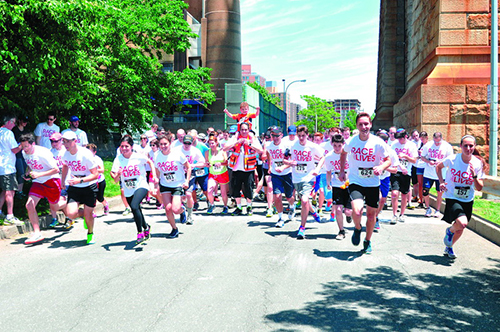

Eli Beer, founder of United Hatzalah of Israel, has been racing to help people and save others his whole life. Now, on a muggy early summer day in June on Manhattan’s Roosevelt Island he was racing for the same reason. Only this time, instead of racing to save heart attack or car accident victims, he was doing it with a 5K finish line in mind.
This was the annual Race to Save Lives charity run United Hatzalah has been holding each of the last four years.
This year, some 425 people participated and raised more than $1 million for what is Israel’s largest not-for-profit, volunteer EMS organization. The money will go toward buying some 60 “ambucycles,” adding to the 300 the organization already fields, which are used to treat 211,000 people in 2013, 47,000 of whom had life-threatening injuries.
If Beer can get that number to 600—each “ambucycle” costs about $26,000—he says he can reduce the organization’s average response time from an already unprecedented three minutes to under 90 seconds. And seconds—as he’ll tell you—may make for personal bests in 5Ks, but when United Hatzalah is involved, they can also make the difference in someone seeing his or her child again, or a child living to fulfill the promise of a young life.
“This is a tremendous organization and it does more good work than you or I will ever know,” said Yoel Fuld, a 45-year-old Teaneck man as he did some mild stretching ahead of the race at the 5K start line. “I’m here because I want to save lives.”
Beer, 40, has been acting on the same motivation for much of his life, or since witnessing on a Friday afternoon at the age of 5 a bus explode on a Jerusalem street during the Intifada. Beer joined the Jerusalem ambulance squads as a teen, but soon found he was losing patients because of traffic. The tipping point came one afternoon when he was summoned to the scene of a little boy choking on a hotdog.
“When I arrived, the lights and sirens of my ambulance prompted a doctor to come out of a nearby house,” says Beer. “He came over as we were doing CPR on the boy and he told us it was too late. And I thought to myself, ‘There has to be a better way. If only that doctor had known a boy was choking such a short distance away, he could have helped. If only my ambulance had gotten there sooner…that little boy would still be alive, today. He might have children. Who knows what he would have lived to do?’”
Today, all of United Hatzalah 2,300-plus volunteers have a GPS app loaded onto their smart phones. When a call comes into the emergency system, GPS is used to locate the nearest five United Hatzalah volunteers. They could be grocers, tailors, financiers, but they all have made a pledge to carry the app and drive an “ambucycle” everywhere they go.
An ambucycle is a souped-up motorcycle that includes everything that an ambulance has besides a stretcher. The volunteers hop on their bikes, navigate traffic, and respond in an average of three minutes or less. They stabilize the patient and await traditional EMS. United Hatzalah charges nothing for its services. The organization sustains itself entirely with donations.
The model has been implemented in São Paolo, Brazil and Panama City, Panama. Training is under way in the Ukraine. Funding is in place in Lithuania. Areas in India are interested. It’s gaining traction, slowly.
Aharon Watson, 22, is a Yeshiva University finance major from Teaneck. But in 2011 he had recently graduated from Yeshiva University High School for Boys in Manhattan and was taking a “gap year” in Israel. Along with pal Alex Goldberg of Riverdale, the Bronx, the pair discovered United Hatzalah and the Race to Save Lives, held in Jerusalem its first two years.
In 2013, Watson brought the race with Goldberg to Manhattan. About 400 people ran, raising $1 million.
“The thing that attracted me to United Hatzalah wasn’t just the great work they do and people whose lives they change,” said Watson, “it was the return-on-investment. When I first learned of U.H. the entire budget was around $3.5 million and they had responded to 220,000 emergencies the prior year. So, if you do the math, that’s $16 for every response call. That’s an astounding figure showing how a small donation of less than $20 can do incredible good for society. The way I thought of it was that for the same cost as a movie ticket, I could potentially save someone’s life.”
To learn more about United Hatzalah of Israel, please visit www.israelrescue.org.











